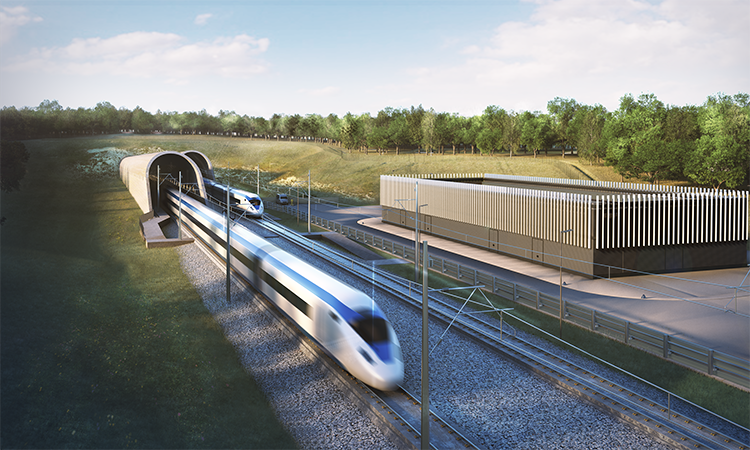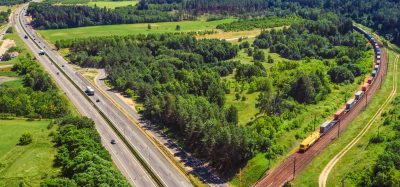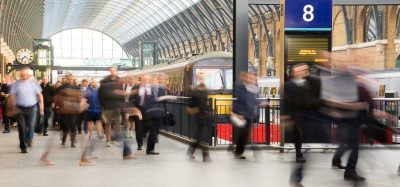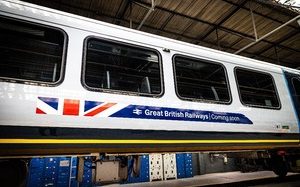UK Transport Secretary gives update on HS2 project delivery
Posted: 10 March 2023 | Global Railway Review | No comments yet
Transport Secretary, Mark Harper, has revealed that the next two years will be used to rephase HS2 construction and optimise future delivery of Phase 2a between Birmingham and Crewe.


Credit: HS2
As part of the UK government’s largest capital programme commitment ever, over £40 billon is to be invested in transformational transport schemes over the next two financial years across the UK, helping to level up local communities and deliver on one of the government’s five priorities to grow the economy.
This includes a continued investment in delivering HS2 – Britain’s new high-speed rail line – which will grow local economies, provide a green transport solution and train a skilled construction workforce.
With over £20 billion spent on Phase One already, the government will prioritise delivering the opening stage of HS2, with the first high-speed rail services running between new stations at Old Oak Common in west London and Curzon Street in Birmingham by the early 2030s. This will be transformative for passengers and communities, ensuring that the earliest benefits of HS2 are retained – creating jobs, attracting investment and sparking housing and commercial regeneration along and beyond the route.
Rephase construction and optimise future delivery of Phase 2a between Birmingham and Crewe
The government states that it remains fully committed to delivering HS2 from Euston to Manchester. However, Transport Secretary, Mark Harper, has revealed that in recognition of inflationary pressures and to help balance the nation’s books, the next two years will be used to rephase construction and optimise future delivery of Phase 2a between Birmingham and Crewe so this is done in the most cost-effective way. This aims to deliver high-speed services to Crewe and the North West as soon as possible after accounting for the rephasing of construction.
At the same time, the government will take the time to ensure an affordable and deliverable design at Euston, with a view to delivering the station alongside high-speed infrastructure to Manchester, while the High Speed Rail (Crewe-Manchester) Bill continues through Parliament.
Work continues on progressing commitments made in the Integrated Rail Plan to develop HS2 East, the proposed route for HS2 services between the West and East Midlands, and to consider the most effective way to take HS2 trains to Leeds.
Mark Harper said: “We know the power of transport as an engine for sustainable economic growth. That’s why – even in this tough economic climate – this government sees transport investment as a down payment on the country’s future and is committing £20 billion over each of the next two years to improve the UK’s transport network. But we can’t ignore the current realities. Putin’s war in Ukraine has hiked up inflation, sending supply chain costs rocketing. The responsible decisions I’ve outlined [today] will ensure we balance the budget at the same time as investing record sums in our transport network to help halve inflation, grow the economy and reduce debt.”
Despite the government’s record £40 billion investment, there are challenging economic headwinds following Russia’s illegal invasion of Ukraine and supply chain disruption as the global economy recovers from the pandemic, which have made project delivery difficult. The government has therefore stated it has had to take tough decisions on what can be achieved within original timeframes.
The industry responds
Darren Caplan, Chief Executive of the Railway Industry Association (RIA), said: “Chancellor Jeremy Hunt announced just last November that he was committed to delivering HS2. This was welcome news following the scrapping of both the Eastern Leg from Leeds to Birmingham, and the cancellation of the Golborne Link, to enable high-speed trains to get from the Northern Leg of HS2 to Scotland. So it is clearly disappointing to hear of this delay, which seems to prioritise short-termism over a structured, long-term strategy for what is Europe’s biggest infrastructure project. The delay postpones the immense benefits the project is set to deliver for the country, including extra capacity, more economic growth, improved connectivity – driving levelling up – and hundreds of thousands of jobs specifically in the Midlands and the North, and also to other parts of the UK more widely. This stop-start approach to a project is an inefficient use of taxpayers’ money, and could ultimately drive the project’s costs up, which is the opposite of what the government is trying to do. We strongly urge the government to push on with delivering the full HS2 scheme, including the Eastern Leg and the Golborne Link, or its replacement, as soon as possible.”
Lord McLoughlin, Chair of Transport for the North, said: “This is a disappointing announcement. But I was reassured by the Transport Secretary that we are still getting HS2 to Manchester, and the recommitment to NPR is welcome. However, it needs to be understood whether or not these cost savings can be realised while still achieving the same desired outcome and conditional outputs. The government needs to avoid being penny wise and pound foolish, as delays don’t necessarily lead to savings, and in fact can drive costs upwards. Nevertheless, the political leaders of the North who sit on our Board have made their collective position very clear – we must transform the North by building both HS2 and NPR in full. Taken together, both projects unlock the North’s economy from the existing position of poor infrastructure that has held it back. It is the communities and businesses across the North of England who are suffering most by any delay or inaction in delivering on these schemes.”
Related content you will enjoy:
Images: HS2 tunnelling machines pass Amersham
Q&A with Rebecca Young of HS2: Apprenticeships in rail
Video: HS2 celebrates tunnels reaching halfway point under the Chilterns
Related topics
High Speed Two (HS2), High-Speed Rail, Infrastructure Developments, Regulation & Legislation
Related organisations
Department for Transport (DfT), HS2 Ltd (High Speed Two), Railway Industry Association (RIA)








